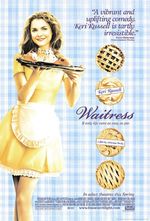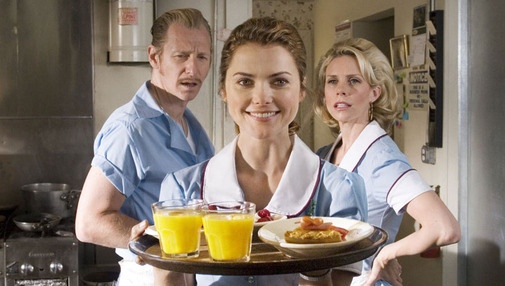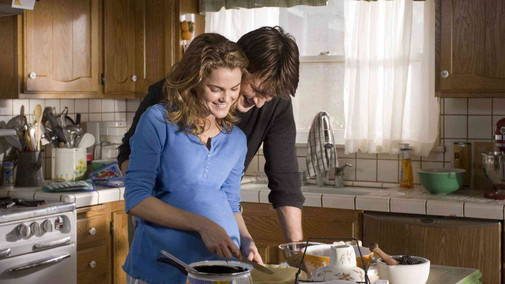By Spencer Coile
 Jenna (Keri Russell) knows pies. Caught in a dead-end marriage to an emotionally and physically abusive husband, Jenna dreams of the day she can finally save up enough money working in the local pie shop and escape her boring life... that is, until she finds herself pregnant. Giving insight into Jenna's mind through the use of potential pie recipes, Waitress follows Jenna as she (begrudgingly) agrees to have the baby, keeps working, and begins an affair with her new doctor (Nathan Fillion).
Jenna (Keri Russell) knows pies. Caught in a dead-end marriage to an emotionally and physically abusive husband, Jenna dreams of the day she can finally save up enough money working in the local pie shop and escape her boring life... that is, until she finds herself pregnant. Giving insight into Jenna's mind through the use of potential pie recipes, Waitress follows Jenna as she (begrudgingly) agrees to have the baby, keeps working, and begins an affair with her new doctor (Nathan Fillion).
Indeed, Adrienne Shelly's 2007 film--released ten years ago to the day--was lauded for its down-to-earth nature, its humble storytelling, and the central performance from Keri Russell. There are no tricks up Shelly's sleeve here; she managed to tell a simple, heartfelt story that is imbued with messages of strength, female friendships, and the power of a good pie. What makes the film equally as affecting is the fact that, although Shelly wrote, directed, and starred in her own work, she was tragically killed before the release. Considering this complicated history, not to mention the film's eventual legacy, let's help oursevles to another slice and dive into the sweet and savory Waitress.
At its core, Waitress is a "cute" movie. It is quirky and brimming with so much personality, a testament to Shelly's voice as a writer, director, and actor. However, in rewatching it for the sake of this article (a task I was happy to perform), I found that there is so much bubbling beneath the film's surface. While it initially plays out like a breezy little rom-com and that Jenna's story could happen to anyone, it is the quiet and deeply intimate moments where Waitress really soars. The relationship Shelly explores between Jenna and Fillion's Dr. Pomatter is the film's biggest breath of fresh air. Although both characters are married, the film never attempts to demonize the adulterous acts they commit. Sure, Jenna feels guilt, but she is also attempting to navigate her ambiguous feelings about motherhood, all while finding meaning to her life. And gone are the stereotypes we have so typically seen that focus on affairs. Dr. Pomatter never turns out to be a jerk who uses Jenna, their relationship does not end dramatically. Rather, in a moment of empowerment, Jenna tells him it is time to forge their own paths. When asked if he had a say in the matter, Jenna acknowledges this question briefly, and says, "No."
It is one tiny piece of dialogue, but speaks volumes to the ways in which Shelly defies the genre of her film. She plays with the tropes we have all seen before: unwanted pregnancy, smalltown living, dreaming of a better life. She does not capialize on these, though. Instead, she humanizes them and makes these moments real. In the end, we want Jenna to succeed. We watch as she makes tough choices; for herself and for her baby, a baby she does not even want. Through voiceover, she apologizes to her future child, wishing she could want this baby. Sure, the film does not dive into Jenna's other options, abortion is not uttered once. While some may find that troubling, there is something so rich in Jenna's journey. She makes peace with the fact that she is having a baby. So... now what?
It truly is a shame that Shelly could not see the impacts her film has left. Within a seemingly simple story of one woman reconciling with her past, present, and future, Shelly has crafted a portrayal still as timely as it was in 2007. Perhaps this is why the film was later adapted into an acclaimed stage musical, with singer-songwriter Sara Bareilles writing the lyrics and score. Nabbing Tony Award nominations for Best Musical, Score, Actress, and Featured Actor in a Musical just last year, it is clear that Shelly's story has left a profound impact on those who come across it. In fact, Shelly's husband even gave the book writer some of Shelly's unfinished scripts to bring her voice to life.
To some, Waitress may feel slight and at times, too simple. But therein lies the beauty of Shelly's last work. Beneath the "cute" veneer lies a story of hope, passion, and what makes us keep waking up in the morning. It is so subtly nimble and aware of itself, that I can't help but just unabashedly love the film, despite some of its flaws. Shelly's work demonstrates the best way to make a pie and that the key to happiness is a baby, sure, but it also shows us that behind each of these moments is a beating heart and a story worth telling.

